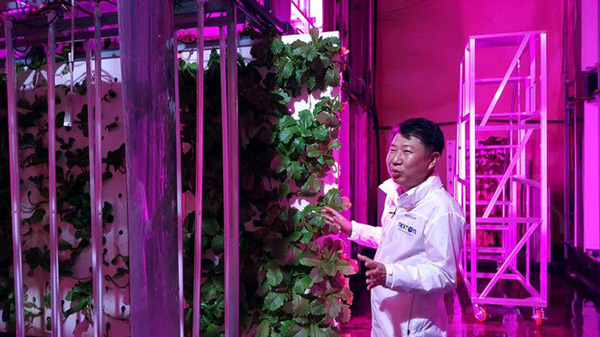South Korea turned an abandoned road tunnel into the world's largest clean vegetable farm, ambitious to revive agriculture
This car tunnel has been closed since 2002, but is now turned into a farm by Korean scientists to grow underground plants.
In the past few decades, the area of agricultural land in Korea has disappeared nearly half. The main reason is global warming: farmers find it more difficult to cope with high temperatures. In addition, the labor force in the country's agricultural sector is also falling sharply as young people largely leave the countryside to the city to look for jobs. In this situation, Korean scientists have come up with a highly feasible solution - building underground smart farms.

NextOn director Choi Jae Bean is explaining how the farm is operated.(Photo: Borneo Bulletin)
NextOn Company opened a vegetable farm in a car tunnel that was deactivated and abandoned for 16 years. It can be said that this is one of the largest farms in the world according to the vertical model. With an area of about 2300 square meters, there are up to 60 different fruits and vegetables grown by unused soil hydroponics: the roots are submerged in nutrient solutions.
South Korea turned an abandoned road tunnel into the world's largest clean vegetable farm, ambitious to revive agriculture.
Scientists use neon pink light of LEDs to replace sunlight, and turn on classical music (such as Claude Debussy's "Moonlight") instead of birdsong to stimulate growth for plants here.

Farm entrance.(Photo: Borneo Bulletin)
Because it is underground, the temperature of the farm is always stable in the range of 10 to 22 degrees Celsius - depending on human adjustment. The Korean Ministry of Agriculture believes that vertical farms like this could help revive agriculture not only in Korea but also worldwide. The ministry also announced plans to expand agricultural complexes like this one. Accordingly, in the next few years they will expand the farm area nearly twice: from 4000 to 7000 hectares.
- Bomb shelter turned into a clean vegetable farm in London
- In order to eradicate dirty food, the Germans had an amazingly great discovery
- The largest green farm in the world in the heart of magnificent Paris
- 4 farm-saving solutions for growing organic green vegetables
- Build Asia's largest agricultural test farm
- Indoor farms provide high productivity
- Indoor farm for over 80 tons of clean vegetables every year
- Japan built the world's largest wind farm
- Vegetable-free vegetable plant in China
- Robots help travelers to take care of clean vegetables at home
- Rare image of agriculture in Korea
- Planting vegetables by hydroponic method
 'Fine laughs' - Scary and painful torture in ancient times
'Fine laughs' - Scary and painful torture in ancient times The sequence of numbers 142857 of the Egyptian pyramids is known as the strangest number in the world - Why?
The sequence of numbers 142857 of the Egyptian pyramids is known as the strangest number in the world - Why? History of the iron
History of the iron What is alum?
What is alum? Digging water pipes, discovering 2,100-year-old 'time-frozen' treasure
Digging water pipes, discovering 2,100-year-old 'time-frozen' treasure  A giant rock shaped like an alien causes fever
A giant rock shaped like an alien causes fever  Europe's largest floating solar farm is about to operate
Europe's largest floating solar farm is about to operate  Floating farm - The future of the Dutch livestock industry
Floating farm - The future of the Dutch livestock industry  The farmer refused 40 billion in compensation to grow vegetables in the middle of the airport
The farmer refused 40 billion in compensation to grow vegetables in the middle of the airport  The 'incredible' farm uses sun and sea water to produce 17,000 tons of tomatoes a year
The 'incredible' farm uses sun and sea water to produce 17,000 tons of tomatoes a year 